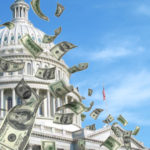The Virginia Constitution grants exemption from local real estate taxes for veterans with 100% service-related disability and for the Gold Star families of those killed in action, a move enthusiastically endorsed by voters in 2010. But in a House Finance Committee subcommittee this morning Virginia’s local governments presented the General Assembly with a bill.
The subcommittee endorsed two bills to provide localities reimbursement from the state treasury for the real estate taxes foregone. House Bill 363 from Del. Mark Cole, R-Fredericksburg, would allow the reimbursement once the tax exemption amount exceeds one percent of the overall local real estate tax revenue. House Bill 1496 from new Del.Martha Mugler, D-Hampton, did not set a threshold and would reimburse all lost revenue.
The proposals provided a valuable lesson on the financial consequence of the General Assembly granting politically attractive broad tax exemptions from local taxes, leaving localities to cover the cost. It was a lesson that was promptly forgotten a few minutes later in the same meeting.
The Department of Taxation estimates that the state would need to send localities $37 million per year or more in reimbursement under Mugler’s broader bill. Cole’s bill would have a smaller financial impact, but during discussion of both it became clear the value of this exemption is only going to grow. Stafford County’s commissioner of the revenue reported the exemption now represents 3% of its real estate tax base (1,132 taxpayers), and by 2025 will relieve these families of $9 million in taxes.
Mugler, who happens to be married to Hampton’s Commissioner of the Revenue, said the initial estimate when the exemption began in 2011 was that it would benefit 150 families in her city, and reduce revenue $375,000. It is over 300 properties now, with an impact in excess of $2 million.
Commissioner Scott Mayausky of Stafford had 2018 data showing a similar impact on several localities, topping out at $5.7 million on Prince William County. Chesterfield County had the largest number of enrollees that year, 1,348 homeowners. Local government lobbyists lined up behind Mayausky to support either or both bills to move the cost burden to the state.
The subcommittee did recommend that the bills, if reported by the full Finance Committee later this week, would have to go over to the Appropriations Committee, leaving it the fun task of finding the reimbursement dollars in the state budget. It may be aware a Senate version similar to Cole’s bill has already died.
It then moved on to set up the same possible scenario, this time on local business taxes paid by the politically sacrosanct solar generators. Some of the exact same local government lobbyists stood up to complain about the impact on their local budgets, but the subcommittee endorsed two bills to extend the local machinery and tools tax exemption enjoyed by utility-scale solar exemptions.
Del. Jay Jones, D-Norfolk, brought House Bill 1131 and House Bill 1434 (the links are to substitutes) and both were approved on party line votes. The state grants an exemption from 80% of the local machinery and tools tax to qualifying projects, an incentive set to expire in 2024. If these bills are approved projects can still qualify as late as 2030, and plenty more projects are in the pipeline.
The second bill does create a step-down formula for future tax breaks, with the 80% reduction going down to 70% in five years, and then 60% at ten years. But the exemption holds for the life of the project. Jones praised it as “a wonderful step in the right direction” toward the overall goals of a lower or no carbon energy future for the state.
Susan Seward, Board of Supervisors chair for Sussex County, expressed strong opposition to the bill and said her county may never approve any such project because of the lost revenue. A member of the subcommittee, Del. Joe McNamara, R-Salem, drew a direct line from this discussion back to the higher-than-expected local fiscal hit created by the break for veterans.
He was right, of course, and the logical next step for localities will to be to come back in a few years with yet another summary of the impact, and yet another bill for the state’s General Fund. How much? The fiscal impact statements prepared by the Tax Department usually cover state taxes, and don’t try to score the local tax impacts up or down. (That might be the first thing to fix.)
It’s not that the subcommittee had no sympathy for the localities. It approved several new ways for them to tax themselves. It advanced bills to allow several rural Virginia localities to impose an additional 1% sales tax within their borders, to pay for school projects. This will eventually be all localities. And it endorsed the bill from its full committee chair, Del. Vivian Watts, D-Annandale, to allow counties to match the taxing authority of cities. Her House Bill 785 allows local county taxes on cigarettes, admissions, prepared means, room rentals and travel campgrounds, with no referendum required.
Objections from the businesses that might see lost sales from those taxes, in particular tobacco manufacturers Altria and Reynolds, were ineffectual.


Leave a Reply
You must be logged in to post a comment.